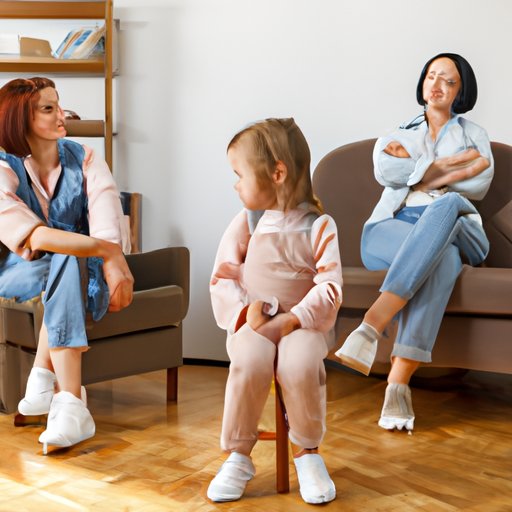
Introduction
Leaving your kids at home alone is never an easy decision for a parent. But, at some point, every parent will find themselves grappling with the question, “At what age can you leave kids home alone?” We know that the safety and well-being of your child is of utmost importance. That’s why we’ve put together this guide to help you understand the legal guidelines, potential risks and hazards, and tips on how to prepare your child for this important milestone.
Legal Guidelines
First and foremost, it is essential to know that legal guidelines for leaving kids home alone vary by state and country. As a parent, you must be aware of these guidelines and comply with them to avoid legal issues. For instance, in the United States, there is no federal law regarding an individual age when a child can be left home alone. However, some states have specific laws and guidelines.
Generally, most states do not have a minimum age requirement for leaving children home alone. Instead, they offer guidelines and suggest that parents assess the maturity and safety of their child before making any decisions. For example, the American Academy of Pediatrics advises that children under 12 years should not be left home alone without adult supervision.
It’s important to note that failing to adhere to legal guidelines can result in neglect charges. Hence, it is vital to research the specific laws and guidelines applicable in your state.
Tips and Considerations for First-time Parents
Being a first-time parent can be challenging, especially when faced with new responsibilities such as leaving your child home alone. The following tips and considerations can help you prepare for your child’s first solo experience:
Preparing for the First Time
Before leaving your child at home alone, it is essential to have a clear plan of action. Talk to your child about your expectations, rules, and responsibilities. Teach them how to use important equipment such as a phone, oven, and doors, and ensure that all emergency numbers are available. If possible, consider practicing with your child, leaving them at home for short periods to gauge their level of readiness.
Factors that Affect Readiness
Every child is different and responds uniquely to various situations. Therefore, parents must consider some factors when determining their child’s readiness to stay home alone. Such factors include their age, ability to follow instructions, level of maturity, and temperament.
How to Assess Your Child’s Maturity Level
One essential factor to consider is your child’s maturity level. Mature children can generally handle situations better and follow instructions with less supervision. Some ways to assess your child’s maturity include:
– Considering their ability to handle unexpected situations
– Observing their decision-making skills
– Assessing their understanding of rules and safety
– Looking out for their capability to solve minor problems independently
Potential Risks and Hazards
Parents must be aware of the potential hazards that can occur when leaving their children home alone. These may include severe injuries, dangerous activities, emotional issues, or vulnerability to predators. To mitigate the risks and ensure that your child is safe, consider the following safety measures:
– Set clear boundaries and rules
– Restrict access to dangerous equipment or substances
– Monitor technological interactions
– Provide instructions on how to handle emergencies
– Check-in with your child frequently
Age Range for Kids to be Left Home Alone
The ideal age range for leaving kids home alone varies depending on various factors such as maturity, safety, and readiness. Referencing the legal guidelines, most states recommend not leaving children under twelve years old alone without adult supervision. Some states have higher age limits, with some setting the age limit to fifteen years. However, it’s important to note that even at the age range set by your state, it’s best to consider factors that affect readiness and maturity level before making this decision.
Parent’s Personal Experiences
Hearing the experiences of other parents can help you understand the nuances of leaving a child home alone and provide insights into what works and what does not. Many experienced parents have shared their wisdom online, providing more perspective about the subject.
One parent, for instance, explains that it’s important to train your child by practicing short intervals before leaving them home alone for longer periods. Additionally, monitoring your child’s activity through technological means such as camera systems or phone applications can provide added peace of mind.
Emotional and Mental Preparation
Before leaving your child home alone, emotional and mental preparation is crucial for your child’s safety and well-being. Some children may feel lonely, fearful, or anxious when left home alone, so it’s vital to help your child prepare emotionally and mentally. Some strategies to consider include:
– Encouraging open communication
– Setting boundaries and expectations
– Preparing positive activities to keep them occupied
– Developing a plan to manage fear or anxiety
Conclusion
Leaving kids home alone is a big milestone in both the child and parent’s life, and it is essential to be well prepared. By taking the necessary steps such as following legal guidelines, assessing maturity levels, mitigating risks, and providing emotional preparation, parents can ensure their child’s safety and well-being during such moments.
We encourage parents to adopt responsible parenting and safe child practices. By doing so, we can ensure our children develop the necessary skills to become independent and responsible citizens.





